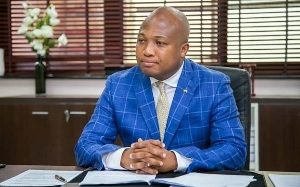CAN A UNIVERSITY CHANCELLOR OR VICE CHANCELLOR BAR FREEDOM OF EXPRESSION AND ASSOCIATION ON A UNIVERSITY CAMPUS? (PART 1)
In the General News of Saturday, 9 June 2007 the Ghanaian Chronicle carried an article titled VC Threatens to Deny Student Certificate?( www.ghanaweb.com). According to the report the Vice Chancellor of the University of Ghana, Prof. C. N. B. Tagoe has allegedly threatened among other things to withhold the final certificate and results of one student activist, Benjamin Akyena Bantuo, a former President of the Junior Common Room (JCR) Commonwealth Hall who has been in detention for weeks over issues of disagreeing with the Chancellor's decision to prohibit all forms of student's gathering and also being a threat to national security.Since when did disagreeing with authority’s (e.g., the Vice-Chancellor's) decision become unlawful in Ghana? Or when did all forms of student's gathering become a threat to national security? (The key word here is “ALL).” It is true that according to article 12 (2) ones rights can be revoked for the public interest. But what is the public interest here? How is the student a threat to national security? Does the state of emergency still apply here-after these many days? Why is the Vice-Chancellor singling out Akyena when he does not alone constitute the student body or movement? According to chapter 5 article 17 (1) “All persons shall be equal before the law. (2) A person shall not be discriminated against on grounds of gender, race, colour, ethnic origin, religion, creed or social or economic status. (3) For the purposes of this article, "discriminate" means to give different treatment to different persons attributable only or mainly to their respective descriptions by race, place of origin, political opinions, colour, gender, occupation, religion or creed, whereby persons of one description are subjected to disabilities or restrictions to which persons of another description are not made subject or are granted privileges or advantages which are not granted to persons of another description.
Article 21 of chapter 5 of the 1992 Constitution spells out some fundamental human rights and freedoms for Ghanaians which are being violated here:
(1) All persons shall have the right to - (a) freedom of speech and expression, which shall include freedom of the press and other media; (b) freedom of thought, conscience and belief, which shall include academic freedom; (c) freedom to practise any religion and to manifest such practice; (d) freedom of assembly including freedom to take part in processions and demonstrations; (e) freedom of association, which shall include freedom to form or join trade unions or other associations, national or international, for the protection of their interest; (f) information, subject to such qualifications and laws as are necessary in a democratic society; (g) freedom of movement which means the right to move freely in Ghana, the right to leave and to enter Ghana and immunity from expulsion from Ghana. (2) A restriction on a person's freedom of movement by his lawful detention shall not be held to be inconsistent with or in contravention of this article. (3) All citizens shall have the right and freedom to form or join political parties and to participate in political activities subject to such qualifications and laws as are necessary in a free and democratic society and are consistent with this Constitution.
Exceptions to the rule are also provided14 (1) Every person shall be entitled to his personal liberty and no person shall be deprived of his personal liberty except in special cases and in accordance with procedure permitted by law. Is VCs intended actions permitted by law under this circumstance?
According to the report, Benjamin Akyena Bantuo , the activist received a letter from the Chancellor before his detention at the Police Headquarters that threatened to deny him of his certificate and results over the said issues which he believes has not been presented to the Disciplinary Committee of the University for investigation contrary to standing procedure in the University's statues. Since when did the laws of Ghana permit detention without trial? However, article 23 of the constitution states that. “Administrative bodies and administrative officials shall act fairly and reasonably and comply with the requirements imposed on them by law and persons aggrieved by the exercise of such acts and decisions shall have the right to seek redress before a court or other tribunal”.
SOME COMMENTS
Another interesting scenario is the peoples' perception to authority as flawless. Our attitudes (comments) suggest why the laws do not work in Ghana like any African country when justice is due the common person. Comments on the said case on Ghanaweb depict the negative, latent and passive Ghanaian mentality of permitting authority to have a free ride- Read ‘BE QUIET AND GET WHAT YOU CAN TAKE” Referring to Akyena, he continues, “Fight for what? He is only there for another year or so and what is he fighting for? He is there to learn and gain knowledge and help society.”
TO BE CONTINUED



















